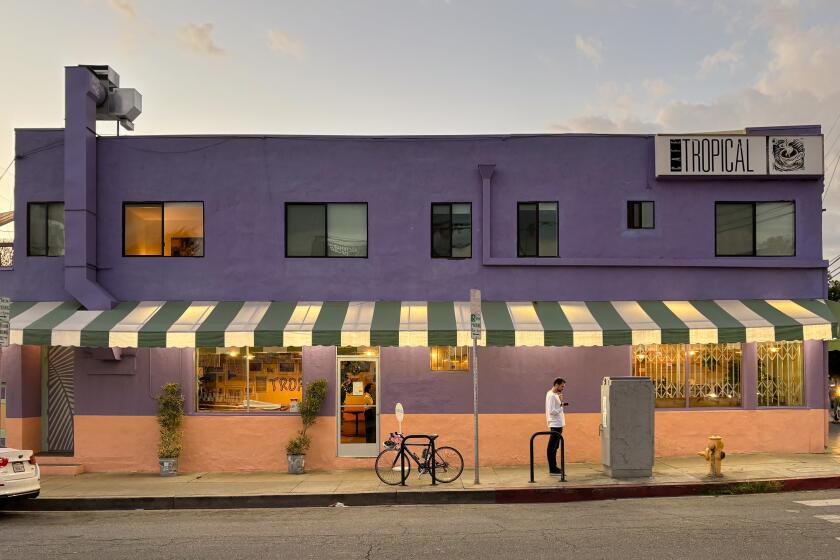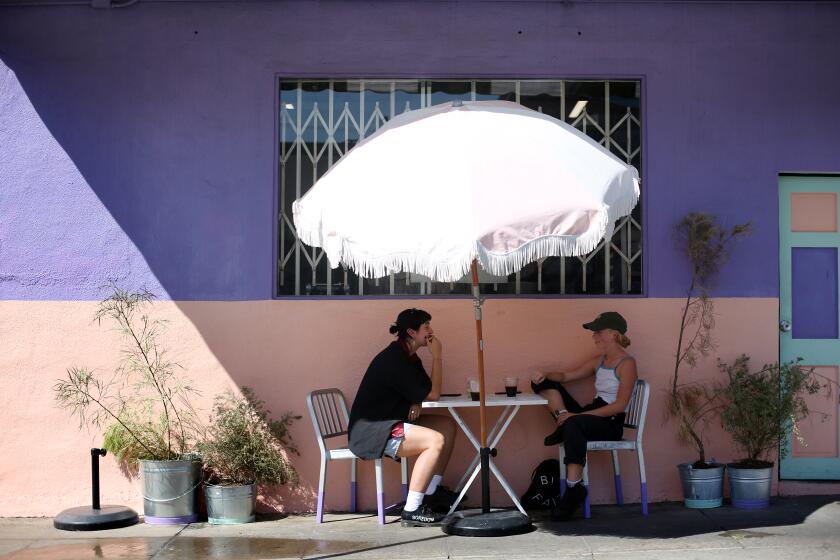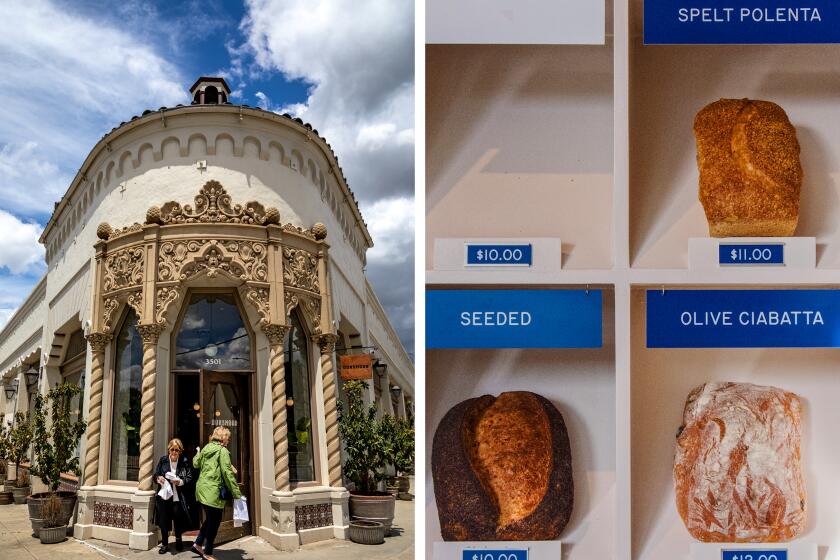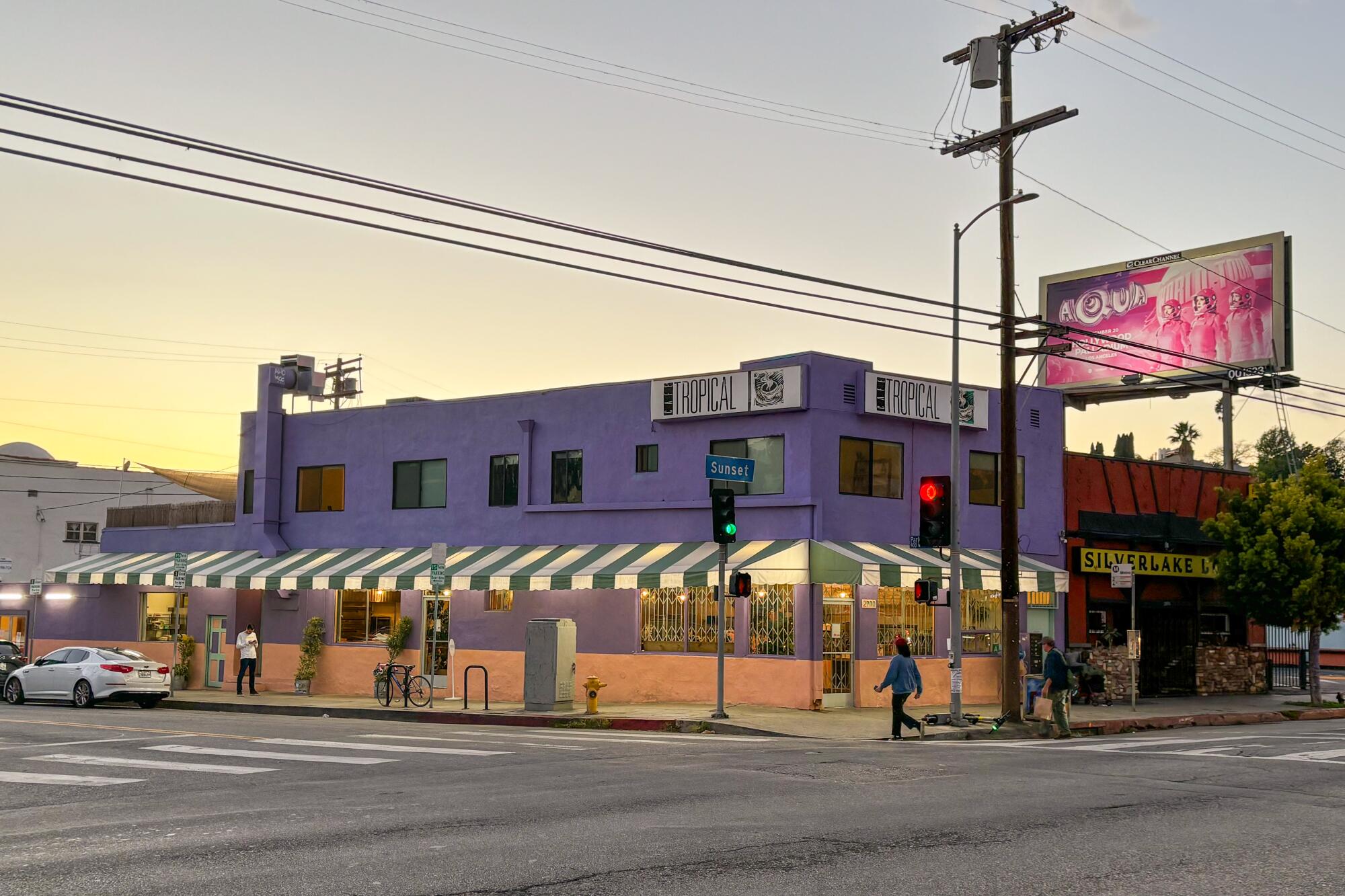
- Share via
In front of Café Tropical on Thursday, as the sun was setting and staff were saying goodbye one last time, a sharply dressed man with slicked-back hair approached the windows of the restaurant with a look of disappointment and resignation. He said he was a part of the recovery community and had come to say goodbye.
I had to tell him Café Tropical, which had faithfully served the community since 1975, had closed a day early.
“It fostered generations of people who were able to point to this location as a lighthouse of hope,” the man said. He declined to be identified, reflecting the custom among some in addiction recovery to not speak about their process in public.
“There were meetings that happened all day and night,” he added. “I look back on it with so much gratitude. And they didn’t ask for much … ‘The only price that we’re gonna ask is that you purchase some pastries.’”
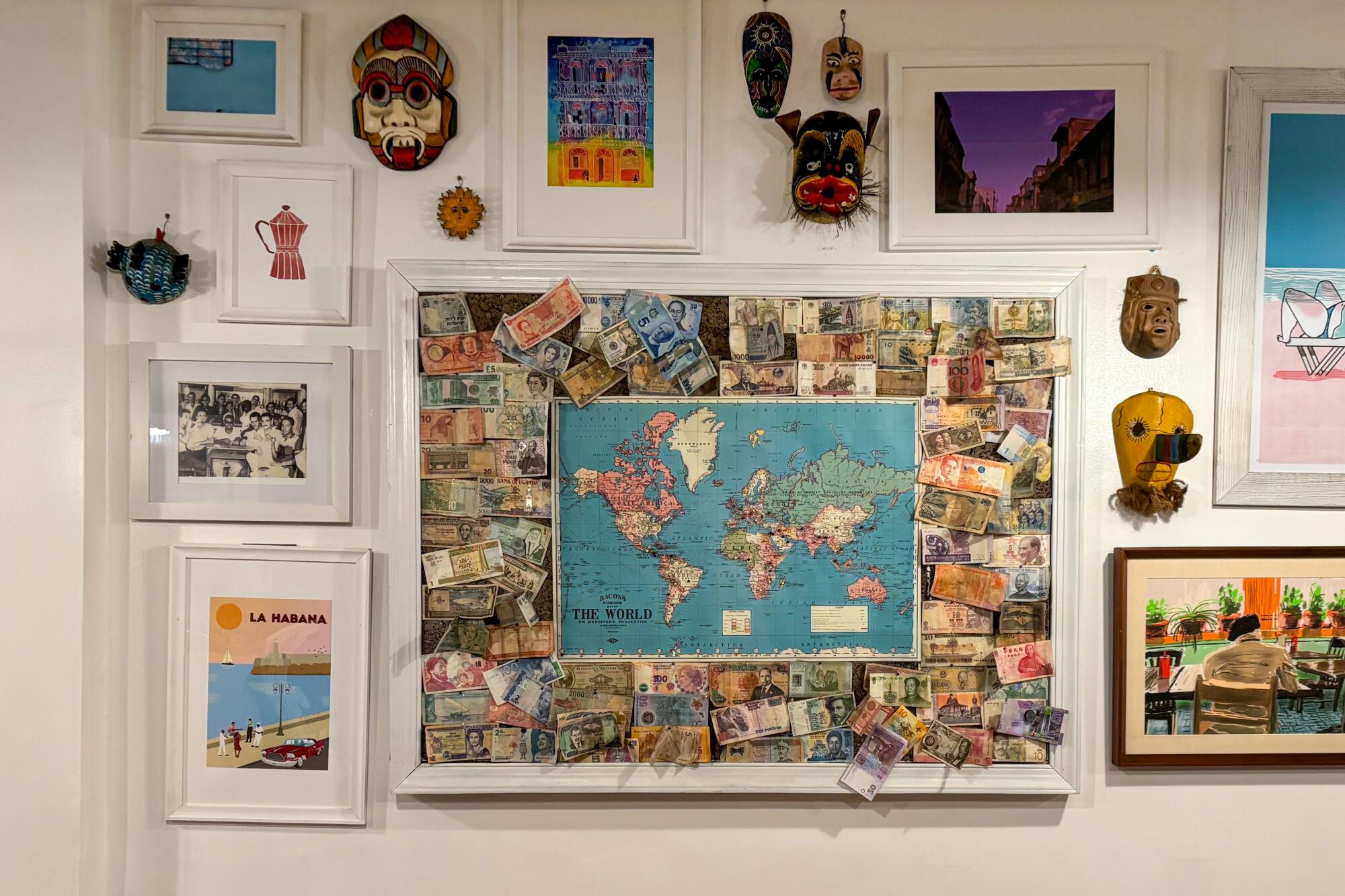
Café Tropical is gone, due to an internal legal dispute, and even sooner than expected. The restaurant was supposed to close on Dec. 1, according to a sign posted on the door earlier in the week.
Angelenos mourned the Silver Lake fixture of nearly 50 years. But a lesser known aspect of the closure is that it is also a wrenching loss for a large community of people seeking sobriety.
Countless meetings were held over the years for those who struggle with, or know someone who struggles with addiction. The meetings, which happened for decades throughout the day and night in a back room at Tropical, will now have to find another home.
“Words fail,” said Ann Bradley, who moved to Silver Lake in 1979. “There are people who can trace their absolute roots of recovery from alcoholism and drug abuse to Café Tropical.”
Court documents reviewed by The Times show that the closure is tied to a simmering family dispute and debts over the restaurant, which Daniel Navarro bought in 2019.
On the outside were the distinctive pastel purple walls, plenty of outdoor seating and a striped awning. And inside, good conversation, decor you might see at a college town coffee house (tattered books, colorful lights, currencies from around the world adorning the walls) and the incessant whir of grinding espresso beans.
And naturally there was food: sweet guava pastries, medianoches and a never-ending parade of cafés con leche. I have personally eaten more breakfast sandwiches there than I can count, on either its croissants or Cuban bread.
My favorite thing to order might have been a big fresh-squeezed orange juice with an extra cup on the side full of crushed ice. When poured over the ice, the juice became a foamy, almost creamy concoction that had me imagining Caribbean ports-of-call I’ve never set foot in.
Owner Daniel Navarro and business partner Jonathan Rubenstein did not immediately respond to requests for comment.
The Cuban restaurant El Cochinito and bar Bolita, sister businesses of Café Tropical, all closed with similar suddenness last week. The closure appears to be related to a family legal dispute between Navarro and his mother, as well as a separate lawsuit filed against Café Tropical claiming unpaid rent.
Located on Sunset Boulevard, Café Tropical was bought in 2019 by the owners of El Cochinito and Bolita.
Cars pulled up and stopped on the last day, with drivers peeking out with looks of confusion, then consternation. High school teacher Rima Añosa came with her daughter. After realizing she had arrived too late to eat at the cafe one last time, her eyes welled up with tears.
“I’m just heartbroken that they’re closing,” she said. “Because you know, like many residents in this neighborhood, we get priced out and I had to move out. I just wanted to come back for one more treat and a goodbye.”
‘Once it’s gone, it’s gone.’
She had planned to get the guava cheese pie, guava empanadas, a mango smoothie for her daughter and a café con leche for herself.
“I always wonder what happened to the old businesses. Where are they going to go and where are the clientele going to relocate?” said Añosa, who lived in the neighborhood for 20 years but left four years ago.
“It’s sad. It’s sad to say goodbye.”
“I’ve been coming here since ‘82,” said Osker Jimenez, a Silver Lake resident originally from Lincoln Heights. “And it’s always been that same taste, it’s never changed over the years. All ethnic groups, all ages, good people, bad people. Even the homeless eat here.”
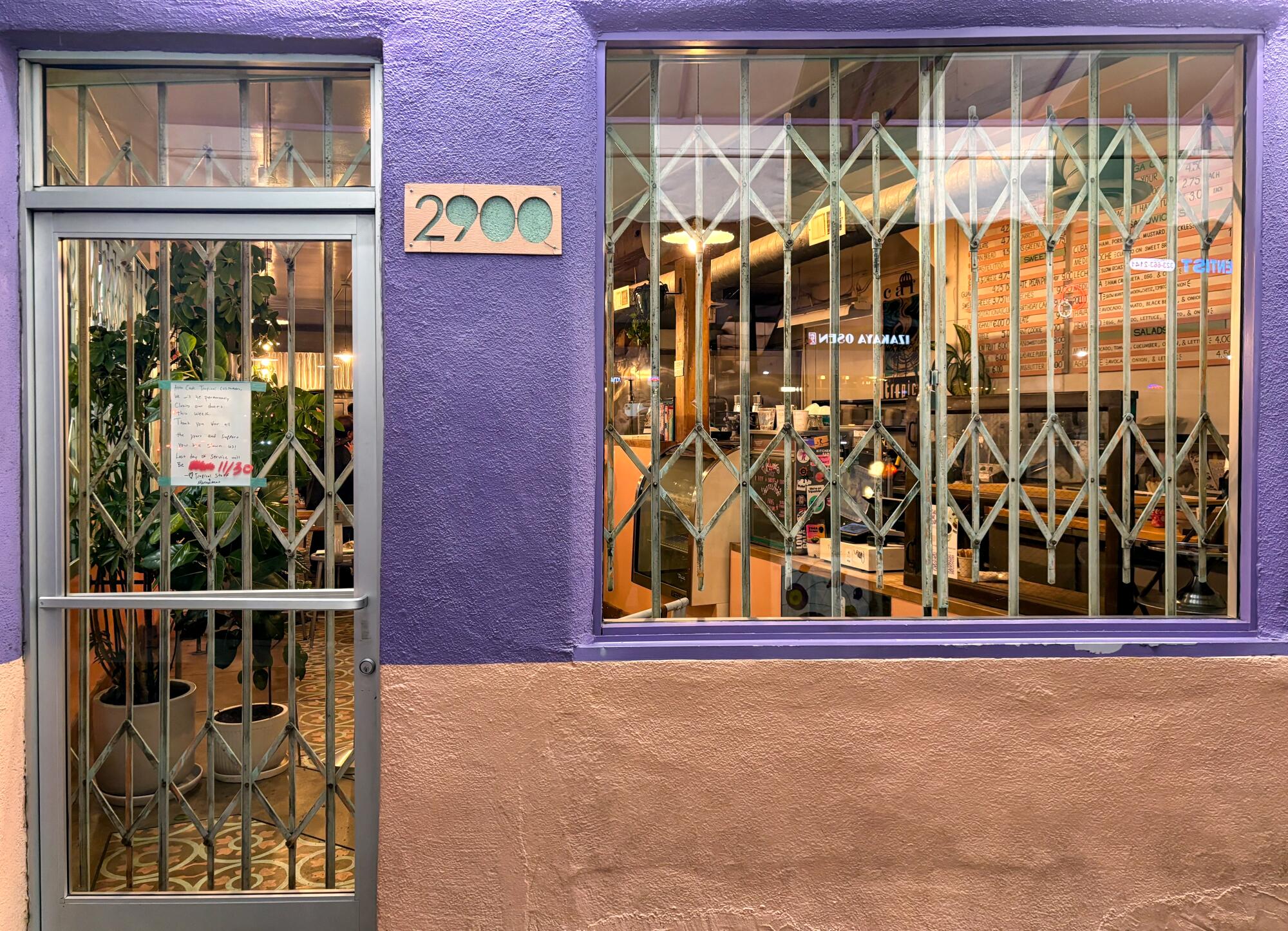
Writer RJ Smith, who moved to L.A. in the early 1990s to work at LA Weekly, said he began noticing groups of people congregating out on the sidewalk in front of Tropical after he first got here.
“I started asking about what was going on at the time that I was also interested in stopping my drinking,” he said. “Somebody just said, ‘Well, I’ll tell you how I stopped … go to Tropical. Talk to someone there.’”
Smith recalled meetings were held in the back of Tropical throughout the day, for all different groups.
“There just must be so many people, now scattered to the winds already, who remember the sounds and the funk and the communal conversations there in various languages. And it’s just gone,” he said. “Once it’s gone, it’s gone.”
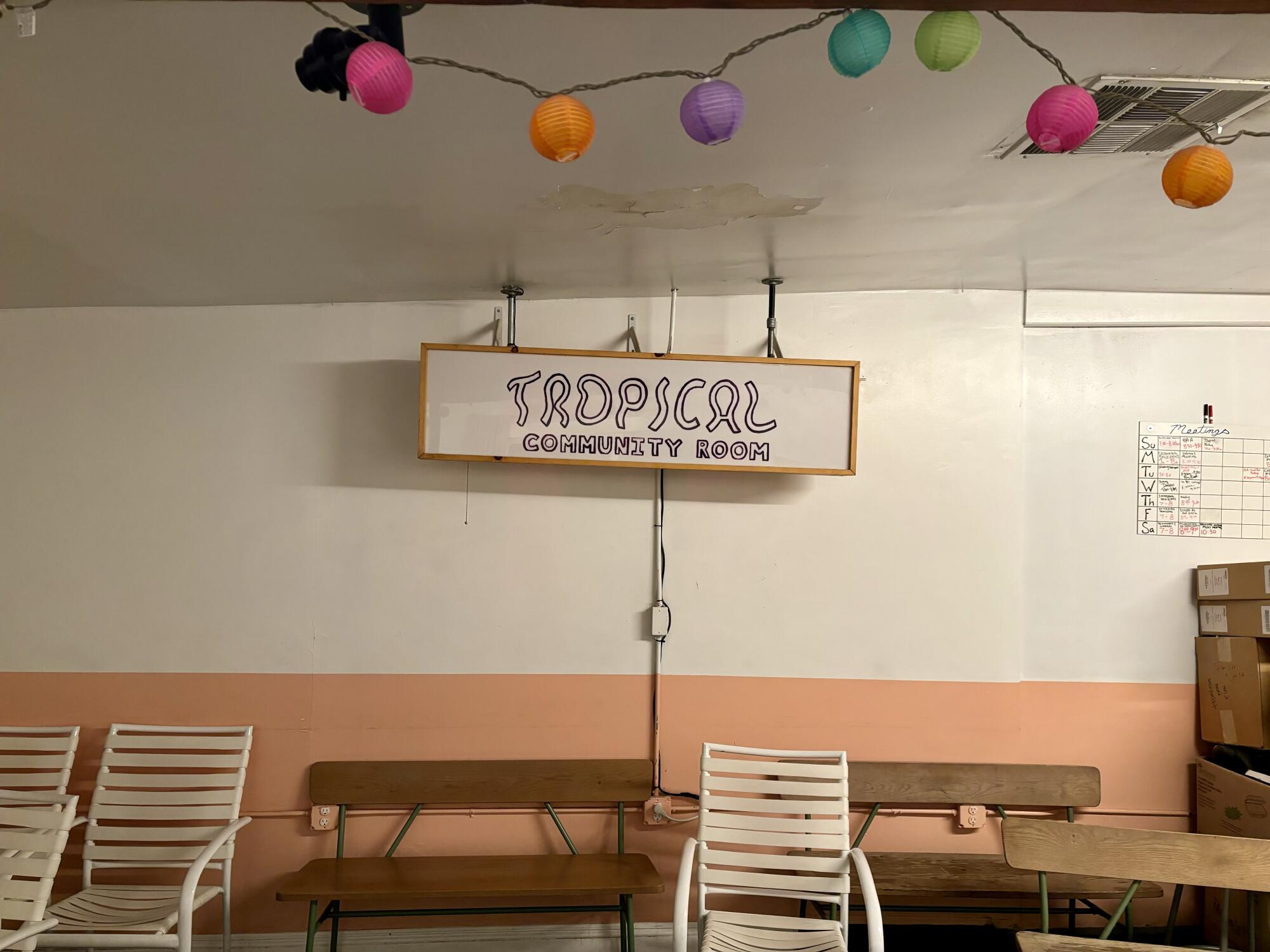
A woman who lives in the San Fernando Valley and asked not to be named said the meetings she attended at Café Tropical were a safe haven for people from all walks of life. “As a person in recovery, it’s sort of one of the stations of the cross, even nationally in terms of recovery meetings,” the woman said. “Because before I knew anything about L.A., when I would come visit here from New York, I knew about the Tropical.”
“I think it’s deeply sad to all the communities that use that lovely little corner,” she added.
Longtime resident Bradley called her experiences attending meetings at Tropical “transformative.”
“We have a saying in the recovery community, we’re always held up by friends who aren’t necessarily needing to be in recovery, but they help the recovery community.” She spoke with particular fondness for Donato Lopez, who owned the cafe for several years. “We just absolutely loved him.”
A writer invited longtime neighbors to taste new restaurants Dunsmoor and Bub and Grandma’s. But first let’s talk about parking.
Slice of L.A. with a Cuban legacy
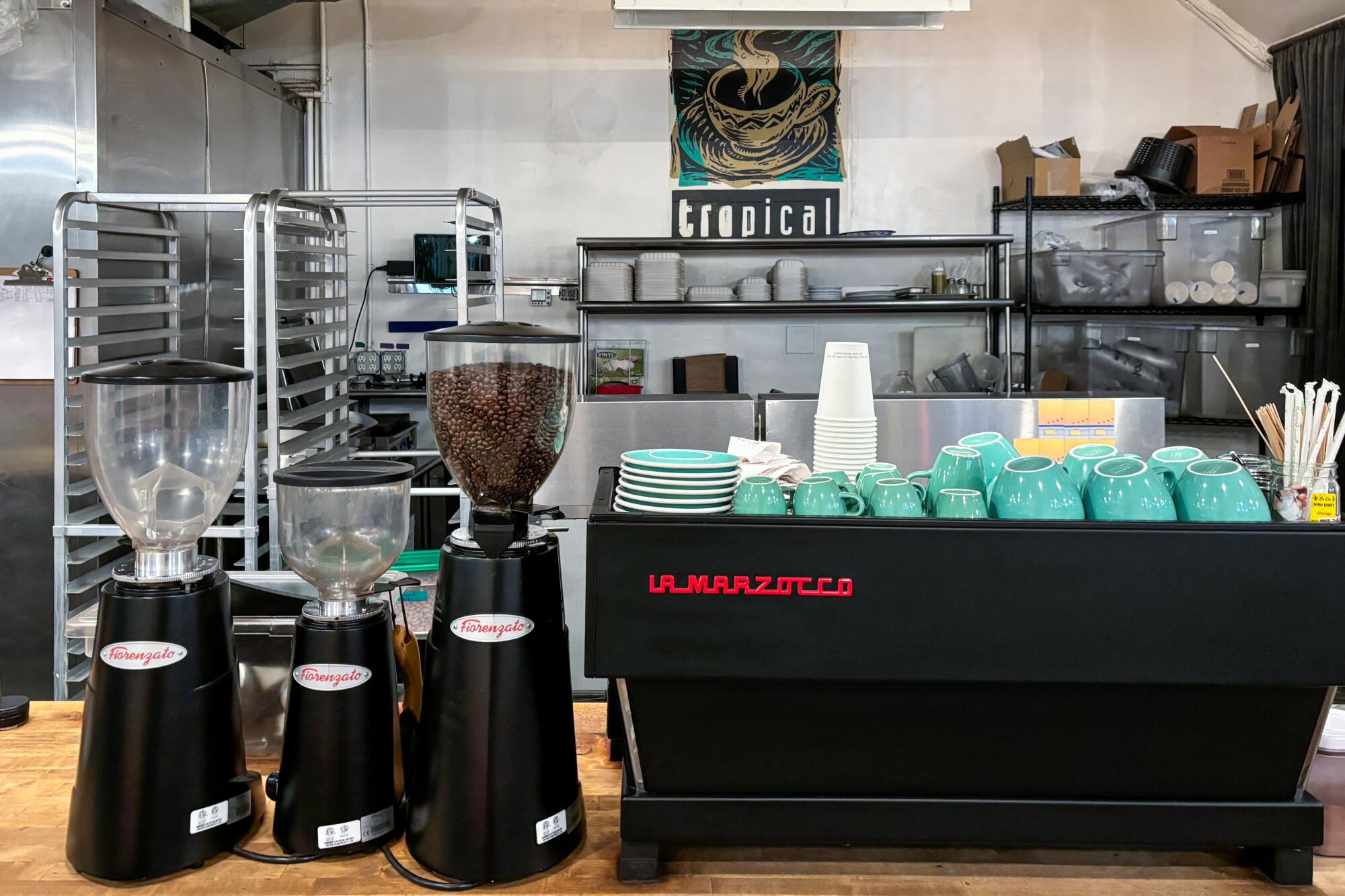
In addition to being a loss for the recovery community, Café Tropical and El Cochinito were two of the last remaining Cuban restaurants on a corridor of Sunset Boulevard from Silver Lake into Echo Park that once catered extensively to the Cuban American community.
The northeast corner of Echo Park Lake still honors Cuban writer José Martí. But many of the old businesses are gone, including the original Porto’s Bakery location, as well as El Carmelo’s, which is now the pizza place Masa.
“For many Latino and Cuban immigrants, that strip of Sunset that ties together Echo Park and Silver Lake was held together by Latino urban anchors, many of them Cuban,” said Natalia Molina, a professor at USC who wrote a book about her family’s longtime restaurant at what is now the venue the Echo.
“‘Everything that made L.A. not cookie cutter is just disappearing, one business at a time,” Molina said.
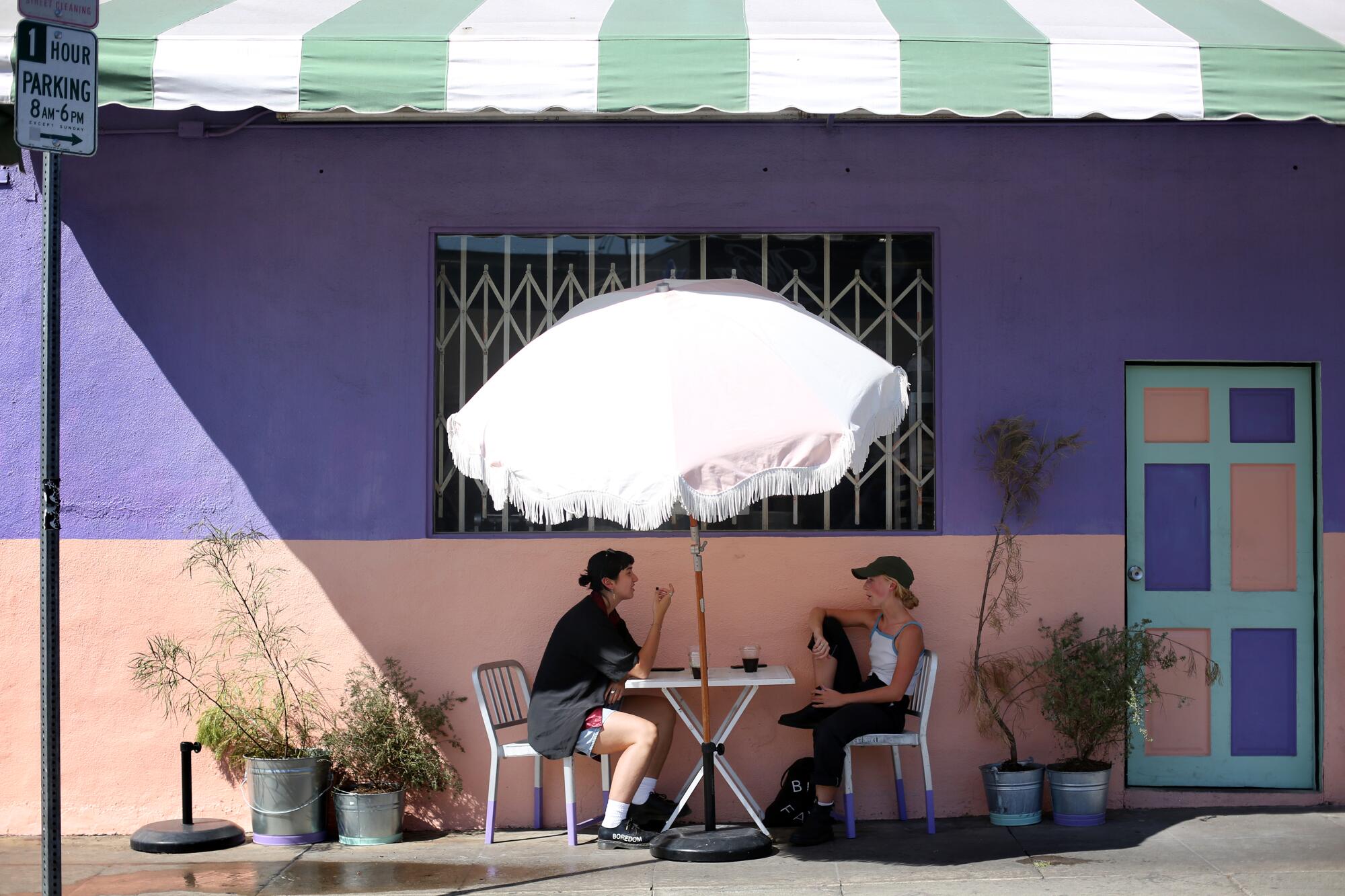
Writer and former Times staffer Lynell George echoed those sentiments. George, an L.A. native who began going to Café Tropical in the late 1980s, spoke with concern about the vanishing of another local landmark.
“What I worry about the most is the loss of the texture and feeling of these places that offer an authentic experience of someone’s culture, their past, their futures,” she said.
Places like Tropical, George said, are the essence of L.A.
“They’re not manufactured. They don’t look like a Xerox of someplace else. They’re not bland; They’re real.”
The Nayarit Restaurant’s authentic Mexican food, diverse clientele and ripple effect helped make L.A., and Echo Park, what it is today.
City councilmember Hugo Soto-Martínez, whose jurisdiction includes Café Tropical, arrived at the restaurant on Thursday and spoke with the staff, offering support to those who had lost their jobs.
Soto-Martínez said he was “shocked” to hear the news of the closure and said Café Tropical was one of the reasons he moved to the area. He also went to meetings at Tropical. He said that he attended 12-step meetings through CoDA — Co-Dependents Anonymous.
“This is one of the most beloved businesses in the district and I think everyone, including myself, loves it,” he said. “Losing our legacy businesses is a serious issue.”
The Cuban bakery chain Porto’s has been a Los Angeles favorite for decades and is still going strong. Pro tip: You can order any cafe item from any line; pick the shorter one.
How the meetings began
The origins of recovery meetings at Café Tropical date back to around 1993 and a former owner of the business, Jeff Bey.
“You don’t know how many times I’ve had people thank me for saving their lives,” said Bey, who bought Café Tropical around 1990, when it was known as Tropical Ice Cream. Bey said the impetus to host the first meetings at Tropical came a few years later from his late brother Alex, a Vietnam veteran who also worked at the restaurant as a manager.
Alex was profoundly changed by the war, Bey said. (“Two different times, he was the only survivor in his company.”) So when Alex, whom Bey said had gone through a “rough patch,” proposed opening up a part of the building to the community for meetings, Bey agreed.
“How could I not support it?” Bey said. And at some point, “the meetings thing took on a life of its own.”
Bey said that with his work as an attorney and other ventures, he didn’t particularly care if the cafe made money. He was “trying to improve the city in my own little way.”
Bey said he hired Donato Lopez, who was working at another of Bey’s businesses at the time, to work at Café Tropical around 1998. Bey would eventually sell the business to him. Lopez, a beloved figure in the community, owned the restaurant for a few years before he died suddenly in 2016.
“He was just a wonderful human being. He had heart, he cared for people,” Bey said of Lopez.
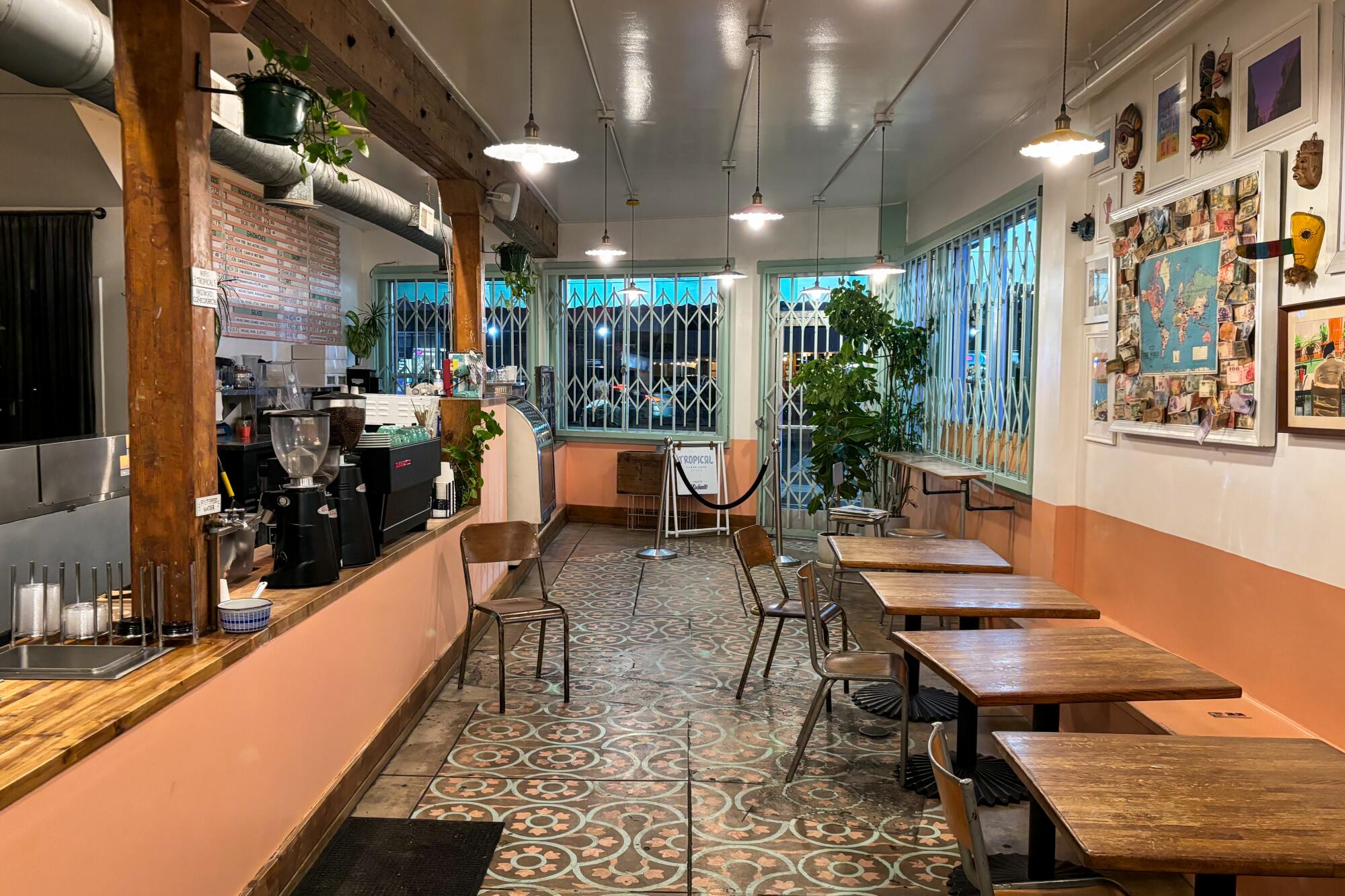
In front of Café Tropical on Thursday evening, through the smell of vehicle exhaust and honking of horns, the sense of loss was palpable.
The building at Sunset and Silver Lake boulevards sits conveniently at a stop for the Metro bus routes 2 and 4. A student who identified himself as Joe explained that a common obstacle for people trying to get sober is transportation, a potentially big problem in car-centric Los Angeles.
“A lot of people in early sobriety, they can’t drive. They either don’t have a license or they don’t have a car. And it was easy to get to a meeting and leave and go do your thing. You could just catch a bus, like I used to.”
Joe said he came to Café Tropical every day from 2016 to 2018.
“I feel like Silver Lake is losing one of its most magical places,” he said. “In that room, miracles literally happened. Individuals came, defeated, looking to start a new life, and it was granted to them.”
More to Read
Eat your way across L.A.
Get our weekly Tasting Notes newsletter for reviews, news and more.
You may occasionally receive promotional content from the Los Angeles Times.
